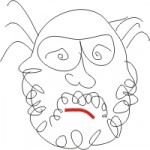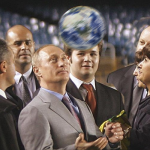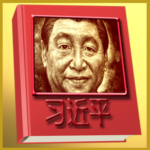
The word “fascism” has been tainted by the Nazi era. The original idea was that government should become a corporation , a super corporation that oversees the state’s businesses.
Putin Proposes State Corporate Structure Modeled After China
After Vladimir Putin hinted at his September 5 Bloomberg interview that he might not run for presidency in 2018 and suggested that the next leader should be “fairly young” but “mature” [Note 1], pundits are now guessing his successor would be either Alexey Dyumin (1972-), the present Deputy Defense Minister, or Anton Vaino (1972-), the newly appointed Chief of Staff [Note 2].
Despite three operational differences between the elitist Russian power succession dynamic — Boris Yeltsin (1991-9) to Putin (2000-08, 2012- ) to Dyumin or Vaino, and the Chinese ‘changing of the guard’ practice — from Jiang Ze-min (1993-2003) to Hu Jin-tao (2003-2013) to Xi Jin-ping (2013- ), these two systems share two significant common features which carry great potential of remodeling world politics in the 21st century.
The first difference is that whereas in China there is a generally called “once-in-a-decade transition of power,” a similar ‘norm’ for a leader’s  duration in power is absent in Russia despite the two-term maximum stipulated in the constitution. In fact, there are certain official policy directives in place binding all the Chinese Communist Party (CCP) members, as prescribed by Deng Xiao-ping, that no one can serve in a position for more than two five-year terms. So far, Zhou Xiao-chuan, as a technocrat working as the Governor of the People’s Bank since 2002, is the only exception.
duration in power is absent in Russia despite the two-term maximum stipulated in the constitution. In fact, there are certain official policy directives in place binding all the Chinese Communist Party (CCP) members, as prescribed by Deng Xiao-ping, that no one can serve in a position for more than two five-year terms. So far, Zhou Xiao-chuan, as a technocrat working as the Governor of the People’s Bank since 2002, is the only exception.
Secondly, in Russia, politicians with military or intelligence agency backgrounds are not barred from consideration for leadership. Putin himself is former KGB. Dyumin, one of the contenders to succeed Putin, commanded the Special Operation Forces of the Russian Army during the recent Ukraine crisis and holds the rank of lieutenant general. In China, everybody knows the iron law that it should be ‘the Party commands the gun’. It means nowadays the military brass has no access to the CCP Politburo Standing Committee — the so called leadership nucleus.
Thirdly, nurturing young elites for leadership in Russia is neither official nor normalized, whereas a formal personnel system consisting of  regular postings (among regions and/or state enterprises) and party school training has been at work for several decades in China. Putin from time to time reshuffles his team both at central and regional levels, for example seven regional governors were reposted in July 2016 which was described by the president’s spokesman Dmitry Peskov as “regular rotation conducted by the head of state”. However, according to analyst Ekaterina Schulmann, “there are no mechanisms for this (generational) change” [Note 3]. On the contrary, in China, a series of postings among provinces, autonomous regions and municipalities as career fostering on one hand and performance evaluation on the other has been deemed as a norm for young cadres to climb up along the hierarchy, and ultimately be selected into the Politburo [Note 4].
regular postings (among regions and/or state enterprises) and party school training has been at work for several decades in China. Putin from time to time reshuffles his team both at central and regional levels, for example seven regional governors were reposted in July 2016 which was described by the president’s spokesman Dmitry Peskov as “regular rotation conducted by the head of state”. However, according to analyst Ekaterina Schulmann, “there are no mechanisms for this (generational) change” [Note 3]. On the contrary, in China, a series of postings among provinces, autonomous regions and municipalities as career fostering on one hand and performance evaluation on the other has been deemed as a norm for young cadres to climb up along the hierarchy, and ultimately be selected into the Politburo [Note 4].
In short, the Russian practice is relatively arbitrary while the Chinese way is much more standardized and systematic.
Nevertheless, they have two politically heavy weight common features. First, they are ‘non-democratic’ if measured by the Western yardstick. According to Yeltsin’s description in his ‘Midnight Diaries’ [Note 5], when Putin was informed in 1999 that he had been chosen to be the successor (as the Acting President), he said, “I don’t like election campaign, I really don’t.” However difficult the electioneering may be, Putin has proved his competence in securing his presidency (2000-08, 2012-), premiership (2008-12), as well as control over the Federal Assembly (Russia’s parliament) since 2000 in his signature style. For this reason, Putin has been portrayed as a ‘New Tsar’ by New York Times and Foreign Policy Magazine. The Chinese way of conducting elections also deviates distinctively from the Western pro forma. Yet, this non-democratic system seems to be consolidating, institutionalizing and normalizing, rather than deforming.
Second, the era of Stalin and Mao has gone; the Russian and Chinese leaders nowadays do not ‘die in office’ (DIO) but serve the nation on a ‘rotational’ basis. It means the leaders play by the rules. Yeltsin had no interference into Putin’s governance. Putin stepped down from the presidency in 2008 as he respected the constitutional restriction on maximum two consecutive terms, and he is now planning for a smooth power succession. Deng, Jiang, Hu also resigned from the office when their tenures came to an end respectively; Xi is generally expected to do the same in 2022/3.
The major strength of this rotational ruler system is that the leaders batch after batch are able to ideate long term visions and carry through long term plans (such as China’s new Silk Road project), while in a democracy any policy is subject to the favors of the next leader (Obamacare may vanish if Donald Trump is elected).
There are of course still lots of weaknesses in such a rotational system but to developing countries like Russia and China it has been very effective in, say, preventing populist struggles for regional interests (take a look at India and Pakistan). Some countries such as Iran, Singapore, Vietnam, Laos and Cambodia are also institutionalizing such type of rotational power succession. All these states may be categorized as authoritarian but they are neither military nor personal dictatorships. Moreover, so far, this non-democratic rotational leadership mechanic has been working not bad for these nations’ social stability, freedoms relaxation (which are slow but steady), and economic growth over the past two decades, for example, Vietnam’s GDP growth rates ranged from 3.14% to 8.46% throughout 2000-16.
If the Third World nations led by Russia and China could keep on growing not just by economic transformation but also with a stable rotational power succession system, imagining that Syria were being governed by leaders in rotation rather than by Bashar al-Assad for lifetime, world politics might be much more stable with less ‘failed states’, even in case democracy in the West would become more dysfunctional in PIIGS and the United States.